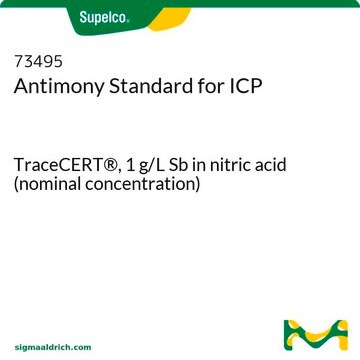91490
Tridecane
analytical standard
About This Item
Produits recommandés
Qualité
analytical standard
Niveau de qualité
Densité de vapeur
6.4 (vs air)
Pression de vapeur
1 mmHg ( 59.4 °C)
Pureté
≥99.5% (GC)
Durée de conservation
limited shelf life, expiry date on the label
Technique(s)
HPLC: suitable
gas chromatography (GC): suitable
Indice de réfraction
n20/D 1.425 (lit.)
n20/D 1.426
Point d'ébullition
110-112 °C/12 mmHg (lit.)
234 °C (lit.)
Pf
−6-−4 °C (lit.)
Densité
0.756 g/mL at 25 °C (lit.)
Application(s)
petroleum
Format
neat
Chaîne SMILES
CCCCCCCCCCCCC
InChI
1S/C13H28/c1-3-5-7-9-11-13-12-10-8-6-4-2/h3-13H2,1-2H3
Clé InChI
IIYFAKIEWZDVMP-UHFFFAOYSA-N
Vous recherchez des produits similaires ? Visite Guide de comparaison des produits
Catégories apparentées
Application
Mention d'avertissement
Danger
Mentions de danger
Conseils de prudence
Classification des risques
Aquatic Chronic 4 - Asp. Tox. 1
Risques supp
Code de la classe de stockage
10 - Combustible liquids
Classe de danger pour l'eau (WGK)
WGK 1
Point d'éclair (°F)
174.2 °F
Point d'éclair (°C)
79 °C
Équipement de protection individuelle
Eyeshields, Gloves, type ABEK (EN14387) respirator filter
Faites votre choix parmi les versions les plus récentes :
Déjà en possession de ce produit ?
Retrouvez la documentation relative aux produits que vous avez récemment achetés dans la Bibliothèque de documents.
Les clients ont également consulté
Protocoles
Complete workflow for the comprehensive analysis of terpenes in cannabis
Complete workflow for the comprehensive analysis of terpenes in cannabis
Complete workflow for the comprehensive analysis of terpenes in cannabis
Complete workflow for the comprehensive analysis of terpenes in cannabis
Notre équipe de scientifiques dispose d'une expérience dans tous les secteurs de la recherche, notamment en sciences de la vie, science des matériaux, synthèse chimique, chromatographie, analyse et dans de nombreux autres domaines..
Contacter notre Service technique









